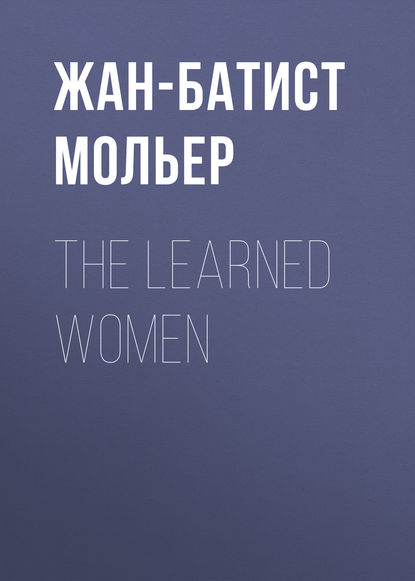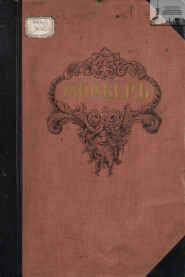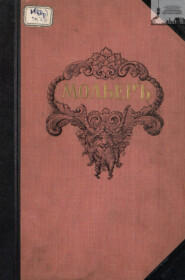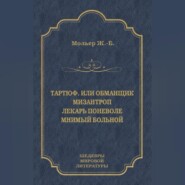По всем вопросам обращайтесь на: info@litportal.ru
(©) 2003-2025.
✖
The Learned Women
Год написания книги
2017
Настройки чтения
Размер шрифта
Высота строк
Поля
ARM. I die from pleasure.
PHI. A thousand sweet thrills seize one.
ARM. If to the bath you take her down,
BEL. Without a moment's haggling, pray,
PHI. With your own hands the miscreant drown. With your own hands, there, drown her there in the bath.
ARM. In your verses we meet at each step with charming beauty.
BEL. One promenades through them with rapture.
PHI. One treads on fine things only.
ARM. They are little lanes all strewn with roses.
TRI. Then the sonnet seems to you…
PHI. Admirable, new; and never did any one make anything more beautiful.
BEL. (to HENRIETTE). What! my niece, you listen to what has been read without emotion! You play there but a sorry part!
HEN. We each of us play the best part we can, my aunt, and to be a wit does not depend on our will.
TRI. My verses, perhaps, are tedious to you.
HEN. No. I do not listen.
PHI. Ah! let us hear the epigram.
TRI. ON A CARRIAGE OF THE COLOUR OF AMARANTH GIVEN TO ONE OF HIS LADY FRIENDS.[2 - This epigram is also by Cotin. It is called, 'Madrigal sur un carosse de couleur amarante, acheté pour une dame.'"L'amour si chèrement m'a vendu son lienQu'il me coûte déjà la moitié de mon bien,Et quand tu vois ce beau carrosse,Où tant d'or se relève en bosse,Qu'il étonne tout le pays,Et fait pompeusement triompher ma Laïs,Ne dis plus qu'il est amarante,Dis plutôt qu'il est de ma rente."]
PHI. His titles have always something rare in them.
ARM. They prepare one for a hundred flashes of wit.
TRI.
Love for his bonds so dear a price demands,
E'en now it costs me more than half my lands,
And when this chariot meets your eyes,
Where so much gold emboss'd doth rise
That people all astonished stand,
And Laïs rides in triumph through the land…
PHI. Ah! Laïs! what erudition!
BEL. The cover is pretty, and worth a million.
TRI.
And when this chariot meets your eyes, Where so much gold emboss'd doth rise That people all astonished stand, And Laïs rides in triumph through the land, Say no more it is amaranth, Say rather it is o' my rent.
ARM. Oh, oh, oh! this is beyond everything; who would have expected that?
PHI. He is the only one to write in such taste.
BEL. Say no more it is amaranth, say rather it is o' my rent! It can be declined; my rent; of my rent; to my rent; from my rent.
PHI. I do not know whether I was prepossessed from the first moment I saw you, but I admire all your prose and verse whenever I see it.
TRI. (to PHILAMINTE). If you would only show us something of your composition, we could admire in our turn.
PHI. I have done nothing in verse; but I have reason to hope that I shall, shortly, be able, as a friend, to show you eight chapters of the plan of our Academy. Plato only touched on the subject when he wrote the treatise of his Republic; but I will complete the idea as I have arranged it on paper in prose. For, in short, I am truly angry at the wrong which is done us in regard to intelligence; and I will avenge the whole sex for the unworthy place which men assign us by confining our talents to trifles, and by shutting the door of sublime knowledge against us.
ARM. It is insulting our sex too grossly to limit our intelligence to the power of judging of a skirt, of the make of a garment, of the beauties of lace, or of a new brocade.
BEL. We must rise above this shameful condition, and bravely proclaim our emancipation.
TRI. Every one knows my respect for the fairer sex, and that if I render homage to the brightness of their eyes, I also honour the splendour of their intellect. PHI. And our sex does you justice in this respect: but we will show to certain minds who treat us with proud contempt that women also have knowledge; that, like men, they can hold learned meetings – regulated, too, by better rules; that they wish to unite what elsewhere is kept apart, join noble language to deep learning, reveal nature's laws by a thousand experiments; and on all questions proposed, admit every party, and ally themselves to none.
TRI. For order, I prefer peripateticism.
PHI. For abstractions I love Platonism.
ARM. Epicurus pleases me, for his tenets are solid.
BEL. I agree with the doctrine of atoms: but I find it difficult to understand a vacuum, and I much prefer subtile matter.
TRI. I quite agree with Descartes about magnetism.
ARM. I like his vortices.
PHI. And I his falling worlds. [Footnote: Notes do not seem necessary here; a good English dictionary will give better explanations than could be given except by very long notes.]
ARM. I long to see our assembly opened, and to distinguish ourselves by some great discovery.
TRI. Much is expected from your enlightened knowledge, for nature has hidden few things from you.
PHI. For my part, I have, without boasting, already made one discovery; I have plainly seen men in the moon.
BEL. I have not, I believe, as yet quite distinguished men, but I have seen steeples as plainly as I see you. [Footnote: An astronomer of the day had boasted of having done this.]
ARM. In addition to natural philosophy, we will dive into grammar, history, verse, ethics, and politics.
PHI. I find in ethics charms which delight my heart; it was formerly the admiration of great geniuses; but I give the preference to the Stoics, and I think nothing so grand as their founder.
ARM. Our regulations in respect to language will soon be known, and we mean to create a revolution. Through a just or natural antipathy, we have each of us taken a mortal hatred to certain words, both verbs and nouns, and these we mutually abandon to each other. We are preparing sentences of death against them, we shall open our learned meetings by the proscription of the diverse words of which we mean to purge both prose and verse.
PHI. A thousand sweet thrills seize one.
ARM. If to the bath you take her down,
BEL. Without a moment's haggling, pray,
PHI. With your own hands the miscreant drown. With your own hands, there, drown her there in the bath.
ARM. In your verses we meet at each step with charming beauty.
BEL. One promenades through them with rapture.
PHI. One treads on fine things only.
ARM. They are little lanes all strewn with roses.
TRI. Then the sonnet seems to you…
PHI. Admirable, new; and never did any one make anything more beautiful.
BEL. (to HENRIETTE). What! my niece, you listen to what has been read without emotion! You play there but a sorry part!
HEN. We each of us play the best part we can, my aunt, and to be a wit does not depend on our will.
TRI. My verses, perhaps, are tedious to you.
HEN. No. I do not listen.
PHI. Ah! let us hear the epigram.
TRI. ON A CARRIAGE OF THE COLOUR OF AMARANTH GIVEN TO ONE OF HIS LADY FRIENDS.[2 - This epigram is also by Cotin. It is called, 'Madrigal sur un carosse de couleur amarante, acheté pour une dame.'"L'amour si chèrement m'a vendu son lienQu'il me coûte déjà la moitié de mon bien,Et quand tu vois ce beau carrosse,Où tant d'or se relève en bosse,Qu'il étonne tout le pays,Et fait pompeusement triompher ma Laïs,Ne dis plus qu'il est amarante,Dis plutôt qu'il est de ma rente."]
PHI. His titles have always something rare in them.
ARM. They prepare one for a hundred flashes of wit.
TRI.
Love for his bonds so dear a price demands,
E'en now it costs me more than half my lands,
And when this chariot meets your eyes,
Where so much gold emboss'd doth rise
That people all astonished stand,
And Laïs rides in triumph through the land…
PHI. Ah! Laïs! what erudition!
BEL. The cover is pretty, and worth a million.
TRI.
And when this chariot meets your eyes, Where so much gold emboss'd doth rise That people all astonished stand, And Laïs rides in triumph through the land, Say no more it is amaranth, Say rather it is o' my rent.
ARM. Oh, oh, oh! this is beyond everything; who would have expected that?
PHI. He is the only one to write in such taste.
BEL. Say no more it is amaranth, say rather it is o' my rent! It can be declined; my rent; of my rent; to my rent; from my rent.
PHI. I do not know whether I was prepossessed from the first moment I saw you, but I admire all your prose and verse whenever I see it.
TRI. (to PHILAMINTE). If you would only show us something of your composition, we could admire in our turn.
PHI. I have done nothing in verse; but I have reason to hope that I shall, shortly, be able, as a friend, to show you eight chapters of the plan of our Academy. Plato only touched on the subject when he wrote the treatise of his Republic; but I will complete the idea as I have arranged it on paper in prose. For, in short, I am truly angry at the wrong which is done us in regard to intelligence; and I will avenge the whole sex for the unworthy place which men assign us by confining our talents to trifles, and by shutting the door of sublime knowledge against us.
ARM. It is insulting our sex too grossly to limit our intelligence to the power of judging of a skirt, of the make of a garment, of the beauties of lace, or of a new brocade.
BEL. We must rise above this shameful condition, and bravely proclaim our emancipation.
TRI. Every one knows my respect for the fairer sex, and that if I render homage to the brightness of their eyes, I also honour the splendour of their intellect. PHI. And our sex does you justice in this respect: but we will show to certain minds who treat us with proud contempt that women also have knowledge; that, like men, they can hold learned meetings – regulated, too, by better rules; that they wish to unite what elsewhere is kept apart, join noble language to deep learning, reveal nature's laws by a thousand experiments; and on all questions proposed, admit every party, and ally themselves to none.
TRI. For order, I prefer peripateticism.
PHI. For abstractions I love Platonism.
ARM. Epicurus pleases me, for his tenets are solid.
BEL. I agree with the doctrine of atoms: but I find it difficult to understand a vacuum, and I much prefer subtile matter.
TRI. I quite agree with Descartes about magnetism.
ARM. I like his vortices.
PHI. And I his falling worlds. [Footnote: Notes do not seem necessary here; a good English dictionary will give better explanations than could be given except by very long notes.]
ARM. I long to see our assembly opened, and to distinguish ourselves by some great discovery.
TRI. Much is expected from your enlightened knowledge, for nature has hidden few things from you.
PHI. For my part, I have, without boasting, already made one discovery; I have plainly seen men in the moon.
BEL. I have not, I believe, as yet quite distinguished men, but I have seen steeples as plainly as I see you. [Footnote: An astronomer of the day had boasted of having done this.]
ARM. In addition to natural philosophy, we will dive into grammar, history, verse, ethics, and politics.
PHI. I find in ethics charms which delight my heart; it was formerly the admiration of great geniuses; but I give the preference to the Stoics, and I think nothing so grand as their founder.
ARM. Our regulations in respect to language will soon be known, and we mean to create a revolution. Through a just or natural antipathy, we have each of us taken a mortal hatred to certain words, both verbs and nouns, and these we mutually abandon to each other. We are preparing sentences of death against them, we shall open our learned meetings by the proscription of the diverse words of which we mean to purge both prose and verse.

















